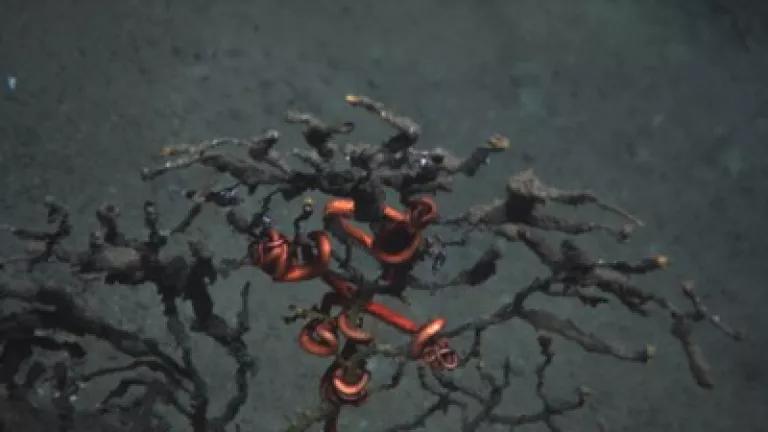
Scientists reported this week that they have positively identified oil from the Deepwater Horizon spill as the culprit behind the slow death of a deepwater coral community in the Gulf.
The dead and dying corals--bare, slimy, and covered in brown fluff--lie seven miles from the spill site and nearly a mile underwater, beneath the path of an oil plume that spread from the 170-million-gallon spill in 2010. A chemical analysis of oil found on the dying coral showed that it came from the Deepwater Horizon spill, and not from natural seeps in the ocean floor.
Starfish clinging to dying coral seven miles from the Deepwater Horizon spill (Credit: Lophelia II 2010, NOAA OER, and BOEMRE, copyright WHOI)
The damage we have come to expect from an oil spill is what we see at the surface--oiled birds and turtles, tarballs on the beaches, oil-soaked wetlands and estuaries where baby shrimp and fish are nurtured. The fact that the spill has affected ocean life nearly a mile beneath the surface is disturbing, and, as the researchers wrote in The Proceedings of the National Academy of Sciences, "unprecedented."
If deep-sea corals a mile underwater aren't safe from the spill, it's hard to imagine that it hasn't touched everything in its path.
We don't yet know how widespread these coral deaths are, or how they might affect other ocean life. We do know that deepwater coral communities are rare in the Gulf, and they are important sources of food and shelter for a range of ocean life. They take centuries to grow, and will take just as long to recover, if they recover at all. We also know that the web of ocean life is complex, and that communities at the bottom of the sea are linked in many ways to the more familiar life at the surface.
Restoring the health of Gulf ecosystems is critical to the recovery of the region as a whole. The Senate recently passed legislation that would direct most of the fines paid by BP into reviving Gulf ecosystems and economies damaged by the spill. The House should follow suit and ensure that the five states primarily affected by the spill are given the support they need to recover.
While there's plenty of anecdotal evidence of strange happenings in the Gulf--unexplained illnesses, dolphin deaths, deformed sea creatures and abnormally low fish catches--the scientific reports are only just beginning to trickle in. It will be years before we can truly begin to understand the effects of spilling 170 million gallons of oil, and a million gallons of untested chemical dispersants, into a complex coastal ecosystem.
But what we've seen so far suggests that the impacts of the Deepwater Horizon tragedy are deeper than we have imagined.